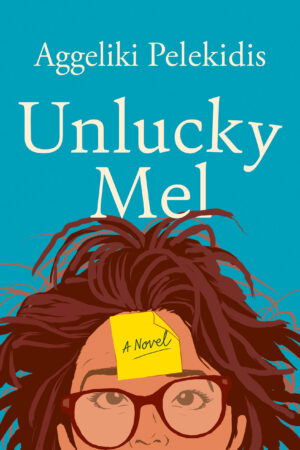Unlucky Mel
by Aggeliki Pelekidis
reviewed by Bailey Sincox
Aggeliki Pelekidis’s debut novel Unlucky Mel is a light-hearted Künstlerroman, or artist’s story, that follows Melody Hollings, a Creative Writing PhD candidate struggling to finish her first book, secure a tenure-track academic job, and manage her personal life. The novel’s fictional setting, Vestal University, playfully mirrors Pelekidis’s alma mater Binghamton (located in Vestal, New York) as Mel mirrors Pelekidis herself. Unlucky Mel will remind readers both of recent campus novels like Elif Batuman’s The Idiot (2017) or Brandon Taylor’s Real Life (2020) and of narratives portraying mature-yet-floundering writers like Andrew Sean Greer’s Less (2017) and Less is Lost (2022).
In the final year of her doctoral degree, Mel juggles many responsibilities. She steals time away from her day job teaching freshman composition for her own writing. At the same time, she begins living with her paleontologist boyfriend Drake and takes care of her senescent father, Collin, who has dementia. Relief from this chaos seems to hinge on receiving manuscript feedback from fellow student Ben Howe, who (unlike Mel) looks “even more the professor.” But as Ben grows evasive––and, conspicuously, gets everything she wants––Mel becomes jaded, wondering “what she might accomplish if she only had a penis.”
Unlucky Mel succeeds as a snapshot of graduate education during the so-called “crisis” of the humanities. Teaching first-year writing in a classroom where “the distinctive perfume of eau d’engineer…hovers in the air,” assigned to a basement office “crowded with two desks and four uncomfortable-looking old chairs,” Mel’s morale is low. Worse still, she knows that her chances of securing a post-graduate position are shakier than the potential “partner hire” her boyfriend offers. Other familiar aspects of graduate school make their way into the novel: professorial egos, nonsensical dissertation titles, grad student “parties,” and department meetings. Pelekedis’s characters, too, are identifiable types, like the “perennial PhD candidate” who, seen through Mel’s eyes, “leaned back in his chair and stretched out his feet, which were protected from the physical dangers of academia by his black leather boots.” If some elements are dated to the novel’s setting in 2007 (MLA convention interviews, chili pepper ratings on the fictional website “GradeYourProfessor.com”), others feel dispiritingly contemporary (sexual misconduct scandals, a lackluster job market).
Anxiety saturates this novel, but so does humor. On the one hand, Mel is debilitated by disillusionment, particularly when she moves back into her childhood bedroom in her father’s house. There, her father hoards yard-sale finds in his increasingly unsanitary house. He forgets to feed the cat; he forgets that Mel’s mother has died. He accidentally sets the newspaper on fire with his cigarette. “This is her future, her weight and age increasing, correlating to a diminishment of all sorts of non-measurable aptitudes, like her desire to write or socialize,” she thinks in a moment of despair. On the other hand, Mel’s woes rev her writerly imagination. She draws from a mental reservoir of fictional tropes to animate her life, populating Vestal’s campus with the cigar-smoking private eyes and femme fatales of film noir. Often Mel’s love of old movies and her penchant for mimicry lead her to parrot ideas at odds with her nascent feminism. “How many of these have ended up in her book to make it outdated––or possibly offensive?” she wonders. Mel’s inner monologue makes even the most cringe-worthy of her choices laughable.
At times this novel traffics in what Mel calls the “hijinks of a teen sitcom.” Mel’s revenge against Ben, for example, involves giving him bad advice to win over his crush and photocopying her backside into his undergraduate syllabus. Perhaps even more puerile is the novel’s Hamlet spoof: Professor Pater (Latin for “father”), like the ghost of old Hamlet, appears to Mel in a dream and reveals that Ben has usurped the department throne thanks to his semi-erotic pedagogical relationship with an aging poetry guru (mercifully named “Tina,” not “Gertrude”). However, such inelegant moments may be attributed to this pseudo-autobiography’s self-reflexive satire.
Unlucky Mel is balm for any reader who has attempted a PhD. Its twinned plots––dissertation and dementia––express the imprisoned, infantilized state many humanities graduate students experience. In an insomniac delirium, Mel calls a psychic to divine how she might improve her life. “Is this how you imagined your life would play out, enclosed in a plastic cubicle––an adult-size playpen––figuring out what people want to hear and giving it to them with an audible smile?” Mel asks. Those who have asked themselves similar questions will find a companion in Unlucky Mel.
Published on January 16, 2025

